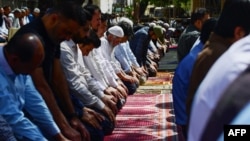The United States is concerned with threats to religious freedoms in Pakistan. Freedom of religion is “deeply interlinked with the freedom of expression, association, movement and assembly,” said U.S. Agency for International Development’s Deputy Assistant Administrator of the Asia Bureau, Änjali Kaur, in a United States Commission on International Religious Freedom panel.
“Where religious freedom protections are absent, we find conflict, instability and terrorism. USAID's work in Pakistan supports a more resilient, gender equitable, inclusive and prosperous nation,” she said.
According to the U.S. Department of State’s 2023 International Religious Freedom Report, Pakistan’s constitution includes severe blasphemy laws and barring minorities such as the Ahmadi groups from identifying as Muslim. There are several reports of religious minorities facing violence and abuse from both authorities and mobs in the country.
The United States has engaged the Pakistani government to urge progress on blasphemy laws and laws concerning Ahmadi Muslims, better protect members of religious minority communities, and encourage interfaith respect.
The U.S. Government has also urged Pakistan “to conduct full and transparent investigations into violent incident s against members of religious minority groups to hold those responsible fully accountable,” said Deputy Assistant Kaur.
To further inclusivity in Pakistan, USAID is taking a community-based approach. These efforts include building resilience and stability and addressing the specific drivers of radicalization by undermining the legitimacy and attraction of violent extremist organizations in conflict affected areas, said Deputy Assistant Administrator Kaur.
“For example, the Building Peace in Pakistan project, implemented by the United States Institute of Peace, strengthens digital news platforms and amplifies the voices of marginalized populations. It has worked in over 600 schools, universities, and madrassas to promote peace, social cohesion and tolerance for diversity through social action projects, policy seminars, awareness sessions, community dialogs and meetings.”
The project’s subjects range from “providing skills and knowledge to student leaders and universities” to “training magazine editors to counter hate speech,” said Deputy Assistant Administrator Kaur.
“USAID will continue to work to help Pakistan create mechanisms for political representation and constructive dialog between the civilian government and citizens, activities that build relationships and trust across sectarian, tribal and religious lines,” said Deputy Assistant Administrator Kaur. “They're all necessary to generate confidence in coexistence and a shared vision for Pakistan's future.”






